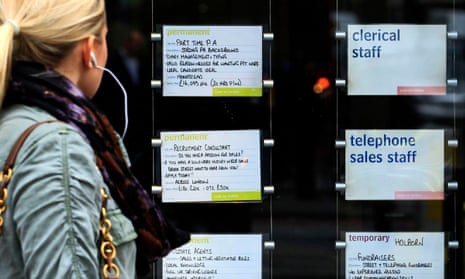Women earn 18% less than men on average, according to new research that highlights the challenge facing Theresa May in closing Britain’s stubbornly wide gender pay gap.
The Institute for Fiscal Studies (IFS) also found that the gap balloons after women have children, raising the prospect that mothers are missing out on pay rises and promotions. That is echoed by a separate report on Tuesday suggesting that male managers are 40% more likely than female managers to be promoted.
May highlighted the gulf between men’s and women’s earnings in her first statement as prime minister when she vowed to create a “Britain that works for everyone”.
But underscoring the struggle her government will face in closing the gender pay gap, the IFS study hints at an entrenched penalty for those women who have children. The pay gap widens consistently for 12 years after a first child is born, by which point women receive 33% less pay an hour than men, according to the research funded by the Joseph Rowntree Foundation.
More than four decades after the Equal Pay Act, there is some encouraging news in the report. The current 18% gap in hourly wages is down from 23% in 2003 and 28% in 1993, the IFS notes.
But at the same time, its research reveals there has been little improvement for graduates and women with A-levels. For the mid-level and highly educated, the gender wage gap is essentially the same as it was 20 years ago.
“The gap between the hourly pay of higher-educated men and women has not closed at all in the last 20 years,” said Robert Joyce, associate director at IFS and one of the report’s authors.
“The reduction in the overall gender wage gap has been the result of more women becoming highly educated, and a decline in the wage gap among the lowest-educated.”
The thinktank says the widening of the hourly wage gap after childbirth is associated with working fewer hours. However women do not see an immediate cut in hourly pay when they reduce their hours. Rather, women who work 20 hours or less per week lose out on subsequent pay rises, meaning that the hourly wages of colleagues in full-time work pull further and further ahead.
Sam Smethers, chief executive at the Fawcett campaign group, said the findings underlined the urgent need for more quality part-time jobs. “We are wasting women’s skills and experience because of the way we choose to structure our labour market,” she said. “Part-time workers can be the most productive, yet reduced hours working becomes a career cul-de-sac for women from which they can’t recover.”
But Mark Littlewood, director general at the free market thinktank the Institute of Economic Affairs, said the study showed employer discrimination was not to blame for the gender pay gap. “If anything, the IFS has provided us with more evidence that the wage gap has nothing to do with gender discrimination. As the study itself notes, women who take time off work and return doing fewer hours are not getting paid less per hour.”
Former prime minister David Cameron had vowed to “end the gender pay gap in a generation” and new government rules are coming in next April that will force bigger employers to publish their pay gap. The UK has also introduced more free childcare and shared parental leave but equality campaigners are concerned too few families can afford for fathers to take it.
Responding to the IFS study a government spokeswoman said: “We want to make our country a place where there is no limit on anyone’s ambition or what they can achieve – that means making sure everyone, regardless of their gender, can succeed at work.
“The gender pay gap is the lowest on record but we know we need to make more progress and faster. That’s why we are pushing ahead with plans to force businesses to publish their gender pay and gender bonus gap.”
A separate report from the Chartered Management Institute (CMI) attempts to shed some light on women’s lack of pay progression by analysing the salary data of more than 60,000 UK managers and professionals. In the past year 14% of men in management roles were promoted into higher positions compared with 10% of women.
The research, carried out with pay analysts XpertHR, cited the difference in promotion rates as one of the main causes of the gender pay gap. The CMI’s measure of the pay gap for managers was 23.1% for this year, compared with 22.8% in 2015.
CMI’s chief executive, Ann Francke, said the rules on reporting pay gaps should force employers to analyse any discrepancies in the salaries of male and female employees. “Promoting men ahead of women is keeping us all back,” she said. “Diversity delivers better financial results, better culture and better decision making.
“Transparency and targets are what we need to deal with stubborn problems like the gender pay gap.”
The researchers also found there were fewer women in executive positions than men. Women comprise 73% of the workforce in entry and junior level roles but female representation drops to 42% at senior management level and 32% at director level.
Mark Crail, content director at XpertHR, commented: “The gender pay gap is not primarily about men and women being paid differently for doing the same job. It’s much more about men being present in greater numbers than women the higher up the organisation you go.”

Comments (…)
Sign in or create your Guardian account to join the discussion